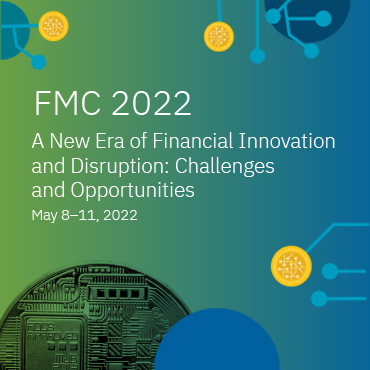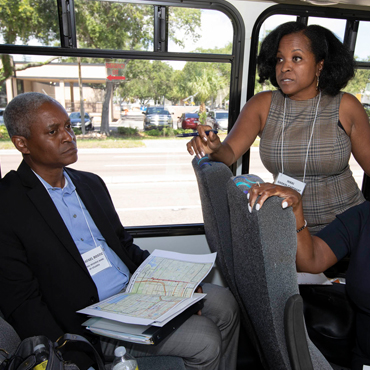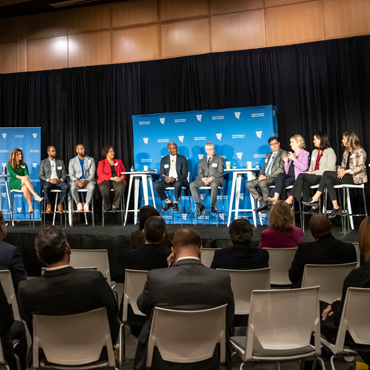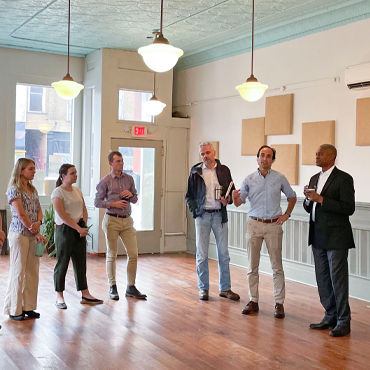Research
Publications explore aspects of monetary policy
The Research Division focused its work on several areas critical to formulating monetary policy.
Two of the most-read Policy Hub: Macroblog posts in 2022 look at inflation:
- "Lessons from the Past: Can the 1970s Help Inform the Future Path of Monetary Policy?"
- "Firms' Inflation Expectations: Not Unanchored, but Perhaps Unsettled?"
Other popular publications focused on another critical area in monetary policy, the labor market. For example, the third most-read Policy Hub: Macroblog post in 2022 addresses the Atlanta Fed's Wage Growth Tracker: "Viewing the Wage Growth Tracker through the Lens of Wage Levels." In addition, a top article from Policy Hub Papers finds that wage growth may not be enough to bring millennials back to the labor force: "Will Wage Growth Alone Get Workers Back Into the Labor Market? Not Likely"
Another popular Policy Hub Papers article considers the execution of monetary policy, examining the question of how to quantify the equivalence between interest rate hikes and quantitative tightening: "How Many Rate Hikes Does Quantitative Tightening Equal?"
Conferences address topical issues
 The Atlanta Fed's 2022 Financial Markets Conference featured policy panels, academic paper presentations, and keynote speakers who explored developments that have a significant impact on the financial system.
The Atlanta Fed's 2022 Financial Markets Conference featured policy panels, academic paper presentations, and keynote speakers who explored developments that have a significant impact on the financial system.
The Financial Markets Conference returned in person last May, exploring "A New Era of Financial Innovation and Disruption: Challenges and Opportunities." The event, which was also livestreamed, featured leaders from central banks, financial firms, Federal Reserve Banks, government agencies, and universities.
Also in May, the Center for Human Capital Studies, part of the Research Division, held its annual employment conference focusing on other issues related to the labor market: labor supply, wages, and inequality. The conference featured papers from across the Federal Reserve System and universities.
The Atlanta Fed, Richmond Fed, and Dallas Fed hosted the fifth annual Technology-Enabled Disruption—or TED—conference, another May conference. The event brought together business leaders, Fed policymakers, and economists on the topics of economic disruption during the
In December, the Research Division hosted another event, a two-day conference looking at Firm Dynamics and the Macroeconomy. Presentations looked at such topics as firm financing, firm innovation, and innovations networks and R&D allocation.
Community and Economic Development
New initiative fosters economic inclusion
 Atlanta Fed president Raphael Bostic visited St. Petersburg, Florida, as part of the Southern Cities Economic Inclusion Initiative.
Atlanta Fed president Raphael Bostic visited St. Petersburg, Florida, as part of the Southern Cities Economic Inclusion Initiative.
Our Community and Economic Development team (CED) launched the Southern Cities Economic Inclusion Initiative in conjunction with the National League of Cities and the Annie E. Casey and W.K. Kellogg Foundations. The initiative intends to support efforts in 16 southern cities seeking to advance economic mobility and resilience. Atlanta Fed president Raphael Bostic participated in trips to St. Petersburg, Florida, and Hale County, Alabama, to share his expertise and better understand local economic conditions to help inform his monetary policy perspective.
External evaluations note usefulness of pilot programs
Through the Advancing Careers for Low-Income Families initiative, the Atlanta Fed and CED provide research and tools to career counselors, employers, and policymakers who help families address barriers to economic mobility and financial self-sufficiency. More than 80 partners across the country use our tools and expertise to foster greater economic mobility. In 2022, external evaluators of three pilot programs using the CLIFF Dashboard found that 75 percent or more of the clients indicated it was helpful for individual career planning.
Community perspectives section is added to Beige Book
CED set out in 2022 to gather and synthesize insights from lower-income workers, consumers, families, and representatives of the organizations and systems designed to serve them. The team held three listening sessions and several interviews in 2022 and, in concert with the Atlanta Fed’s Regional Economics Information Network, provided the Atlanta Fed's first Community Perspectives installment for the Beige Book in November. This new section in our aggregation of anecdotal data from throughout the Sixth District allowed us to convey sentiments of the LMI and small business communities.
Ask Us Anything facilitates national discussion
The Ask Us Anything series from the Center for Workforce and Economic Opportunity brought together policymakers, community partners, and practitioners for national discussions about finding talent with skills-based practices, partnerships between community development financial institutions and workforce development organizations, skills development and green job growth, and the cost of inequality in the labor market.Payments and Financial Services
Payments inclusion is added to website
More than 200 fintechs call metropolitan Atlanta home, and Georgia-based companies processed about 300 billion global payments transactions in 2022. So it makes sense that the Atlanta Fed plays a significant role in the payments system. For example, as part of its efforts to support economic mobility and inclusion, the Atlanta Fed is working to promote payments inclusion. This work is especially important now, as digital payments offer numerous benefits to consumers and businesses but can also exclude from the financial system those who rely on cash. Last year, the Atlanta Fed created a payments inclusion web page to highlight its work to ensure that all consumers and businesses have access to the nation's payment systems.
Federal Reserve Financial Services offer streamlined services
After operating from the Atlanta Fed for more than 20 years, the Federal Reserve’s Retail Payments Office in July 2022 merged with three other Federal Reserve payments services to form the Federal Reserve Financial Services (FRFS)—a single entity to streamline services for the banking system. The FRFS offers all financial institutions access to a system that facilitates more than $5 trillion in payments every day.
Survey and Diary of Consumer Payment Choice join forces
The Survey of Consumer Payment Choice (SCPC) and the Diary of Consumer Payment Choice (DCPC) were released in a combined report in 2022. Together, the Survey and Diary of Consumer Payment Choice create a comprehensive picture of US consumers' payment preferences and behavior and fill a gap in knowledge about consumers’ role in transforming payments from paper to electronic.
Payments webinars cover a variety of topics
Our Retail Payments and Risk Forum’s Talk About Payments webinars covered central bank digital currency, ATM crime, the financial exploitation of older adults, the 2022 word of the year, and noteworthy payments trends.
Regional Economics
Fed Listens goes to Nashville.
 Atlanta Fed president Raphael Bostic, Nashville Branch vice president and regional executive Laurel Graefe, and Fed governors Christopher Waller and Michelle Bowman moderated panel and roundtable discussions and toured a logistics facility.
Atlanta Fed president Raphael Bostic, Nashville Branch vice president and regional executive Laurel Graefe, and Fed governors Christopher Waller and Michelle Bowman moderated panel and roundtable discussions and toured a logistics facility.
In April, REIN hosted a Fed Listens session in Nashville. Atlanta Fed president Raphael Bostic, Fed governors Christopher Waller and Michelle Bowman, and Nashville Branch vice president and regional executive Laurel Graefe moderated panel and roundtable discussions and toured a logistics facility to learn alongside a number of local business and community leaders about conditions resulting from Nashville's fast-growing economy and COVID-19 pandemic recovery dynamics.
 President Bostic and leaders from the Atlanta office and Birmingham Branch spent two days in October with local civic and business leaders in Hale County, Alabama.
President Bostic and leaders from the Atlanta office and Birmingham Branch spent two days in October with local civic and business leaders in Hale County, Alabama.
Atlanta Fed president visits the Black Belt
President Bostic and several Atlanta office and Birmingham Branch leaders in Research, CED, and Public Affairs spent two days in October in Hale County, Alabama, meeting with local civic and business leaders to better understand challenges and opportunities in health care, housing, and economic development in the Black Belt. The visit included multiple roundtables and tours with local, regional, and national entities to enable collaboration and discussion among stakeholders.
Supervision and Regulation
Updated applications page improves user experience
The Supervision and Regulation Division redesigned its Banking Applications page for a more user-friendly and seamless experience. The page enables easy access to Becoming a State Member Bank and the new FedEZFile, a cloud-based tool that provides an intuitive and transparent application filing experience while minimizing paper forms and communications.
Conference offers opportunity to examine and discuss challenges confronting the financial services industry.
The Banking Outlook Conference provided an overview of expected banking conditions, risks, and issues. Community banks’ move to digital platforms, housing, a new regulatory environment, and the accounting implications of cryptocurrency were among the featured topics. Supervision and Regulation’s Bank Holding Company Applications webinar, which featured upgrades to the Banking Applications webpage and regulatory insights, drew 300 participants from the industry.
Office of Employee Benefits
The Atlanta Fed became the supervisory bank for the Federal Reserve Office of Employee Benefits (OEB). This office oversees, implements, designs, and administers benefits programs to approximately 59,000 System employees, retirees, and their beneficiaries.
-

2022 Annual Report
-
Directors & Officers
-
Past Annual Reports



